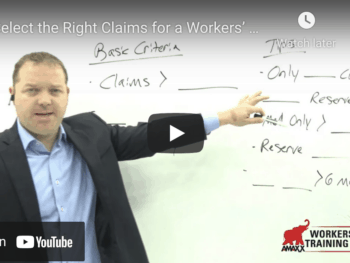Bad Faith Lawsuit Alleges Insurance Company Mishandled Claim
On 6-22-12 in the case of Texas Mutual Insurance Company (TMIC) vs. Timothy J. Ruttiger, the Texas Supreme Court ruled in a 5-4 split decision that Texas workers denied workers’ compensation benefits cannot bring a bad faith lawsuit against the employer’s insurance company. Bad faith litigation normally arises when the insured alleges the insurance company did not handle a first party claim appropriately resulting in unnecessary damages to the insured. For a bad faith claim against an insurance company to be successful, the insured must prove the insurance company placed the insurance company’s interest above the interest of the insured. [WCx]
Workers’ compensation is normally described as the exclusive remedy of an injured employee to recover for medical expense and lost income when they are injured. In exchange for workers’ compensation benefits, the injured employee gives up the right to bring a third party liability claim against the employer.
Click Link to Access Free PDF Download
“Workers’ Comp Claims Review Checklist: 9 Must-Have, Serious-Impact Elements”
Timothy Ruttiger Monday Morning Injury Carrying a Pipe
On 6-1-04, Timothy J. Ruttiger reported to his supervisor that he was injured while carrying pipe. He went to the local hospital where he was diagnosed as having bilateral inguinal hernias. Later that day he went back to his employer and completed the First Report of Injury form.
When the claim was reported to TMIC; the adjuster as standard claim handling starts to investigate the claim. The adjuster learns:
- Ruttiger had played in a softball tournament the weekend before the alleged Monday morning incident and had come to work with a limp
- Ruttiger had reported bragged to a co-worker that he was injured in a softball game but was going to get paid for it by workers’ compensation
- The vice president of the employer noticed when Ruttiger arrived at work that morning that he “wasn’t 100 percent”.
Claim Denied by Texas Mutual Insurance Company
Ruttiger scheduled his hernia repair surgery for 7-14-04. Prior to the surgery, on 7-11-04, the TMIC filed its Notice of Refusal or Disputed Claim with the Texas Workers’ Compensation Commission (WCC), and as required by law, notified the employee of his right to request a Benefits Review Conference (BRC). Ruttiger hired an attorney two days later. The attorney waited until 10-22-04 to request a BRC which was set for 12-2-04. TMIC was not notified of the BRC timely, resulting in it be re-set to 1-6-05.
Benefits Review Conference Rules in Favor of Ruttiger
At the BRC, the benefit review officer determined benefits would be provided. TMIC paid for Ruttiger’s surgery and paid his temporary disability benefits. Before Ruttiger had reached maximum medical improvement, on 6-16-05, he filed suit against TMIC and the adjuster alleging a breach of the common law duty of good faith and fair dealing of the Insurance Code, and violations of the Deceptive Trade Practices Act (DTPA). [WCx]
In his lawsuit, Ruttiger did not claim that TMIC had not provided medical benefits or indemnity benefits, but that the delay in providing the benefits had created additional damages (the lawsuit apparently did not mention that over half of the delay in obtaining benefits was from the time he hired an attorney until the attorney requested the BRC).
The damages alleged by Ruttiger included:
- The delay in providing benefits damaged his credit rating
- The delay worsened his hernias
- The delay caused mental anguish
- The delay caused physical impairment
- The delay caused pain and suffering greater than what would have been if TMIC had provided benefits earlier without investigating the claim
The allegations in the lawsuit against TMIC included:
- TMIC failed to adopt and implement reasonable standards for promptly investigating claims
- TMIC refused to pay Ruttiger’s claim without having conducted a reasonable investigation
- TMIC failed to promptly provide a reasonable explanation for denying his claim
- TMIC failed to attempt to promptly and fairly settle the claim when liability was reasonable clear
- TMIC had misrepresented the insurance policy to him
- The violations of the insurance code authorized recovery under the DTPA.
The jury would disregard the statements made by the fellow employees and medical records indicating Ruttiger’s hernias were preexisting. The jury ruled that TMIC had breached its duty of good faith and fair dealing, committed unfair and deceptive acts knowingly, and in doing so caused damages to Ruttiger. The jury provided Ruttiger with everything requested in the way of damages.
Texas Mutual Appeals to Supreme Court
TMIC appealed. The court of appeals held there was no evidence of credit reputation damages, but affirmed the trial court allowing recovery under the Insurance Code. TMIC petition the Texas Supreme Court for review, which was granted.
The Texas Supreme Court reviewed both the Insurance Code (including the laws on workers’ compensation) and the DTPA. The Supreme Court ruling discussed in depth the interaction between the various laws and the intent of the legislative branch in writing the laws.
The key points in the Supreme Court ruling were:
- The workers’ compensation claim was resolved when TMIC accepted the claim and started paying benefits
- There was nothing in the workers’ compensation law allowing for a bad faith action against the insurer
- The workers’ compensation act eliminates the need for judicial remedies outside of the workers’ compensation Act.
- The three month delay in requesting the BRC was not TMIC’s fault and the delay was the basis for the suit
- The actions of an insurance carrier under the order of the commissioner or recommendations of a benefit review officer many not be the basis of a cause of action against the insurance carrier for a breach of duty of good faith and fair dealing.
Supreme Court Rules No Bad Faith Lawsuit Against Insurer
In ruling that an employee cannot bring a bad faith lawsuit against an insurer for the denial of a claim, Texas joined the majority of states that have considered the issue and disallowed bad faith claims in the context of workers’ compensation.
Author Michael B. Stack, CPA, Director of Operations, Amaxx Risk Solutions, Inc. is an expert in employer communication systems and part of the Amaxx team helping companies reduce their workers compensation costs by 20% to 50%. He is a writer, speaker, and website publisher. www.reduceyourworkerscomp.com. Contact: [email protected].
WORKERS COMP MANAGEMENT MANUAL: www.WCManual.com
Do not use this information without independent verification. All state laws vary. You should consult with your insurance broker or agent about workers comp issues.
©2012 Amaxx Risk Solutions, Inc. All rights reserved under International Copyright Law. If you would like permission to reprint this material, contact us at: [email protected].















